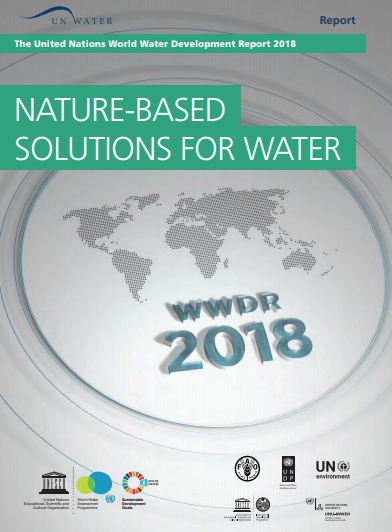UN warns by 2050 5bn people could face water shortages due to climate change, pollution and increased demand
- March 22, 2018
- Posted by: administrator
- Category: Environmental, Global

The United Nations is warning that 5 billion people could be facing water shortages by 2050 as a result of increased demand, pollution and climate change in a new report on the state of the world’s water.
The United Nations World Water Development Report, Nature-based Solutions for Water, launched during the 8th World Water Forum taking place in Brazil, says that global demand will continue to grow significantly over the foreseeable future.
An estimated 3.6 billion people (nearly half the global population) currently live in areas that are potentially water-scarce at least one month per year – this population could increase to some 4.8–5.7 billion by 2050, according to the report.
The trends in water availability and quality are accompanied by projected changes in flood and drought risks. The number of people at risk from floods is projected to rise from 1.2 billion today to around 1.6 billion in 2050 (nearly 20% of the world’s population). The population currently affected by land degradation/desertification and drought is estimated at 1.8 billion people.
Nature-based solutions needed to address global water challenges
The report says that a focus on ‘nature-based solutions’ to tackle water supply and quality issues offer a vital means of moving beyond business‐as‐usual to address many of the world’s water challenges.
The fifth in a series of annual, theme-oriented reports, the 2018 edition examines opportunities to harness the natural processes that regulate various elements of the water cycle, which have become collectively known as nature-based solutions (NBS) for water.
NBS use or mimic natural processes to enhance water availability (e.g., soil moisture retention, groundwater recharge), improve water quality (e.g., natural and constructed wetlands, riparian buffer strips), and reduce risks associated with water‐related disasters and climate change (e.g., floodplain restoration, green roofs).
Audrey Azoulay, Director-General of UNESCO commented:
“We need new solutions in managing water resources so as to meet emerging challenges to water security caused by population growth and climate change. If we do nothing, some five billion people will be living in areas with poor access to water by 2050. This Report proposes solutions that are based on nature to manage water better. This is a major task all of us need to accomplish together responsibly so as to avoid water related conflicts.”
The report says that upscaling NBS will be central to achieving the 2030 Agenda for Sustainable Development. NBS show particular promise in achieving progress towards sustainable food production, improved human settlements, access to water supply and sanitation services, and water-related disaster risk reduction. They can also help to respond to the impacts of climate change on water resources.
Less than 1% of total investment in water resources management infrastructure is on NBS
However, there are still many cases where water resources policy and management ignore NBS options – even where they are “obvious and proven to be efficient”, the report says.
Despite rapidly growing investments in NBS, the evidence suggests that this is still well below 1% of total investment in water resources management infrastructure. The use of nature-based solutions remains marginal and almost all investments are still channelled to grey infrastructure projects.
The vast majority of the growing demand for water will occur in countries with developing or emerging economies.
Agricultural production could be increased by an estimated 20% worldwide if greener water management practices were used. One study cited by the Report reviewed agricultural development projects in 57 low-income countries and found that using water more efficiently combined with reductions in the use of pesticides and improvements in soil cover, increased average crop yields by 79%.
The global demand for water has been increasing at a rate of about 1% per year over the past decades as a function of population growth, economic development and changing consumption patterns, among other factors, and it will continue to grow significantly over the foreseeable future.
Launched during the 8th World Water Forum and in conjunction to the World Water Day, the report demonstrates how nature‐based solutions are offering a vital means of moving beyond business‐as‐usual to address many of the world’s water challenges while simultaneously delivering additional benefits vital to all aspects of sustainable development.
Click here to download the report in full
